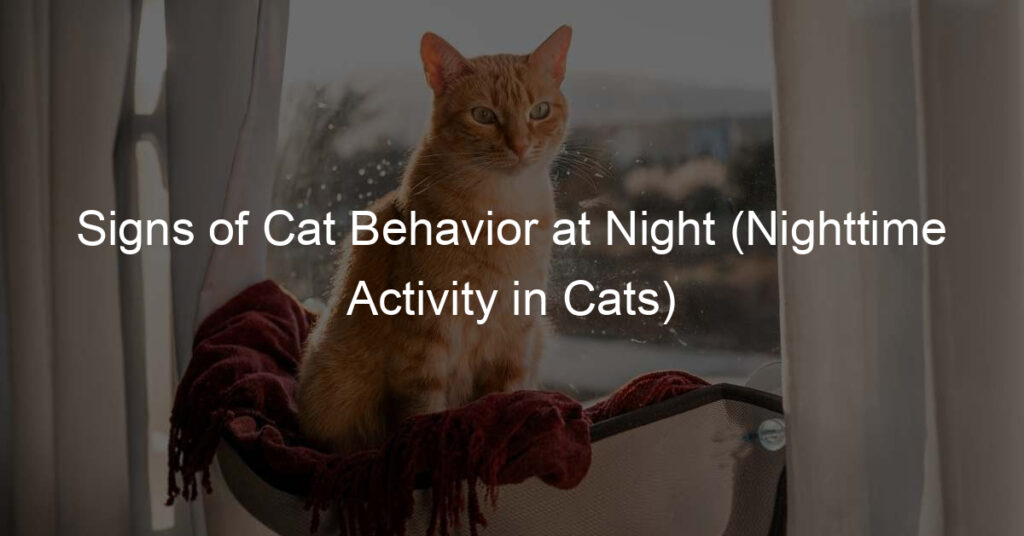If you’ve ever wondered what your cat is up to at night, you’re not alone. Many cat owners find themselves curious about their feline friend’s nocturnal activities. While we may never know exactly what goes on in their minds during those dark hours, there are a few signs of cat behavior that can give us some clues. Here are some things to look for if you’re curious about your cat’s nighttime activity.
What do cats do when they roam at night?
Cat’s nocturnal activity is an enchanting sight to behold. When cats roam the night, they often travel in search of food, exploring their surroundings and establishing their territory.
Cats are also known for communicating with others through scent-marking and vocal sounds such as meowing or purring. Despite being solitary creatures at heart, cats will happily seek out companionship on their nighttime escapades – especially when humans are involved!
Whether it be chasing after toys, chasing away any perceived dangers or just lounging in a patch of sunlight streaming in from a window, cats make the most of late-night adventures.
Do cats become active at night?
Many people enjoy the companionship of cats, however, their behavior might surprise some of us. While cats may be quite active during the day, they also tend to become surprisingly lively late at night when everyone else is preparing for bedtime.
This natural nocturnal state for cats often includes playfulness and physical activity that wakes owners up in the middle of the night. Though it can be irritating or difficult to adjust to, it’s important to remember that this behavior is normal and isn’t necessarily indicative of something wrong with the pet cat.
What sense do cats use at night?
Cats are unique creatures and are more attuned to their environment than most other animals. As the night falls, cats harp on one of their premier senses – hearing. They use their ears in a way that can detect the faintest of noises and allow them to identify potential prey or threats. Additionally, cats also rely heavily on smell to help them hunt and avoid danger. Their amazing olfactory abilities enable them to pick up odors from food and other animals better in low light conditions.
During nighttime activities, it is likely that cats also rely on their sense of touch; they use their whiskers and modified teeth to feel changes in the air and help them find food while they move silently through the shadows. Taken together, cats have an impressive array of senses that they use at night, making them prime predators once the sun goes down.
Where your cat sleeps on your bed and what it means?
Where your cat sleeps on your bed is a telltale sign of the relationship you have with them. If your kitty likes to snuggle up against you, this could signify a strong bond between the two of you, particularly if you are the one that your cat comes to first when they need comfort.
On the other hand, if your furry friend likes to tuck themselves into an isolated corner of the bed, it could indicate that even though they still feel secure and comfortable with you around, they also like their personal space. Allowing your cat to sleep on your bed is a great way to connect with them and create a secure environment they can depend upon.
How do you calm a hyper cat at night?
Having an overly active cat can be quite a challenge when it’s time for bed each night. One of the best ways to help calm down a hyper cat is to tire them out during the day.
Playing interactive games with your pet, such as laser pointer tag, gives them plenty of exercises while also providing needed mental stimulation. If they still need additional activity after playtime, set up a place in your home, such as near a window or on the couch, where they can climb and jump to their heart’s content.
You can also offer comforting scents such as lavender and chamomile in an oil diffuser or spray bottle to help relax them. Finally, create a routine for your cat before sleeping and provide plenty of snuggles and ear scratches throughout the night if needed. With these simple solutions, you’ll soon have yourself a calm and contented kitty ready for some much-needed rest!
Wrapping Up: Signs of Cat Behavior at Night (Nighttime Activity in Cats)
If you have a cat that’s been keeping you up at night with their activity, there are some things you can do to help them adjust. Understand that this is normal behavior for cats and try to give them extra attention during the day so they’re not as restless at night.
Create a safe space for them to explore at night by providing climbing surfaces and toys, and consider consulting with a veterinarian if the problem persists. With a little understanding and effort, you and your cat can enjoy peaceful nights together.








